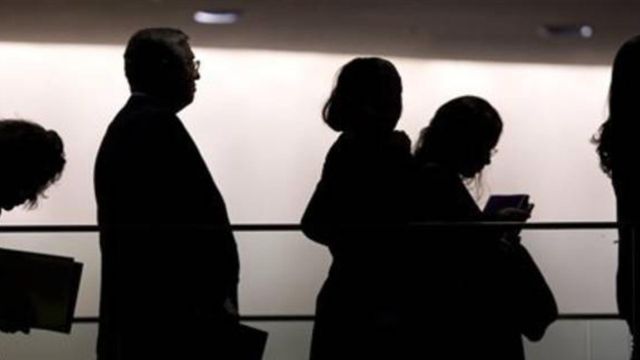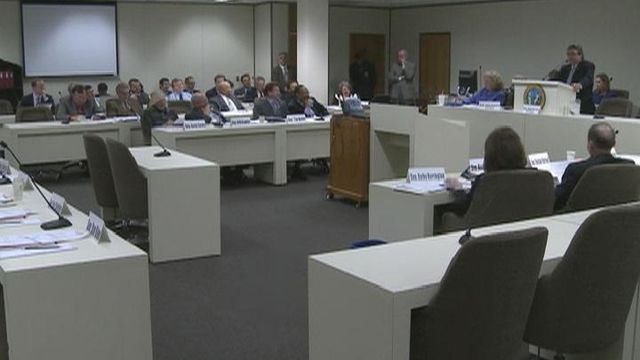Proposed cuts to jobless benefits heading to General Assembly
State lawmakers will consider cutting jobless benefits when they return to Raleigh this month after a legislative committee approved changes to the unemployment program on Wednesday.
Posted — UpdatedUnder the proposal approved by the Revenue Laws Study Committee, a group of House and Senate lawmakers, the maximum weekly benefit for someone out of work would drop from $535 to $350. Also, the state would replace its 26 weeks of benefits with a cap of 12 to 20 weeks, based on the health of North Carolina's economy.
If approved by the General Assembly, the proposed cuts would affect people who apply for unemployment benefits starting in July.
The changes are to help North Carolina repay the $2.4 billion it owes the federal government for jobless benefits assistance during the recession.
The state borrowed money from the U.S. Department of Labor to pay unemployment benefits during the depths of the recession, when payments to the surging number of idled workers far outstripped the money flowing into the state trust fund through unemployment insurance taxes paid by businesses.
North Carolina's unemployment debt is the third-highest in the country, behind only California and New York.
The changes would help the state repay the unemployment debt by 2015 – three years faster than a normal repayment schedule – which officials said would keep federal unemployment insurance rates on North Carolina companies from rising each year to cover the debt.
Sen. Floyd McKissick, D-Durham, urged lawmakers to think twice about cutting benefits, saying people looking for work depend on that money to get by.
"When you're looking at people who are unemployed and you're looking at that money being their only lifeline for survival," McKissick said, "it deeply concerns me when you're looking at such a vast reduction from $535 down to $350. ... I just think we need to have some compassion and respect for the fact that people are at probably the most difficult, challenging points in their lives."
But Rep. Edgar Starnes, R-Caldwell, countered that few people would be affected by the lower maximum benefit.
"To be eligible for that $535 unemployment benefit today, you have to be a high-income earner," Starnes said. "These high-income earners – these are executives and people like that – have other resources that the average worker doesn't have.
"The reductions to the middle-class and the average worker (are) minuscule," he added.
Larry Parker, a spokesman for the state Division of Employment Security, said the maximum benefit cut would hit anyone who makes at least $56,640 a year.
George Wentworth, senior staff attorney with the National Employment Law Project, said the cut could affect up to a third of the people on unemployment, noting that anyone earning more than $36,400 a year would qualify for more than $350 a week in jobless benefits.
In addition to cutting benefits, lawmakers proposed raising unemployment insurance rates on businesses to accelerate repayment of the debt and ensure the unemployment trust fund remains solvent. About 20 percent of North Carolina employers have paid no unemployment insurance and would have to start contributing to the system under the proposal.
Worker advocates have called for businesses to bear a greater share of repaying the debt, noting that the state slashed unemployment insurance rates in the 1990s.
"I feel like we're being cheated of something that should be there as a security buffer," said Rose Henderson, who's been looking for work for 13 months. "Now it's taken away, and I just feel like it's going to throw us that much farther back."
Wenworth said the smaller benefit checks could hurt the economy.
"The average unemployed worker is going to spend that money on food, on rent, on mortgages, on clothing for their children – basically put all of that back into the local economy," he said.
Sen. Bob Rucho, R-Mecklenburg, said the unemployed and businesses need to share the burden.
"(Businesses are) paying their share, the workers are assisting," said Rucho, co-chairman of the Revenue Laws Study Committee. "We've expanded the base. We've done everything we can do to make sure that the unemployment insurance plan is going to be solvent and available for the next group whenever the next recession comes. We are at the worst level of debt ever."
Joyce Brooks, who hasn't had a permanent job in at least two years, said unemployed workers are getting a raw deal.
"It's about greed – point blank. Why should they give us something more when they could make more?" Brooks said.
• Credits
Copyright 2024 by Capitol Broadcasting Company. All rights reserved. This material may not be published, broadcast, rewritten or redistributed.






